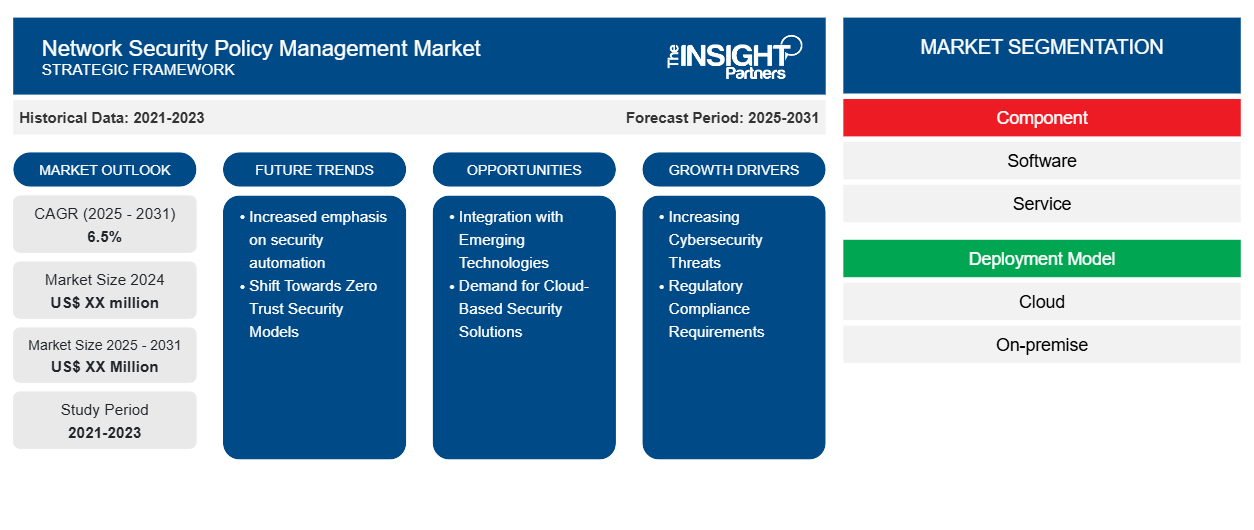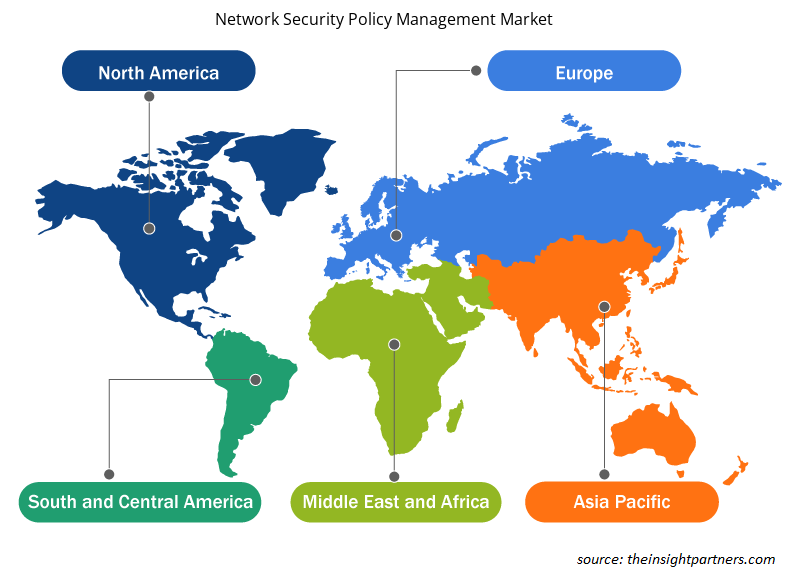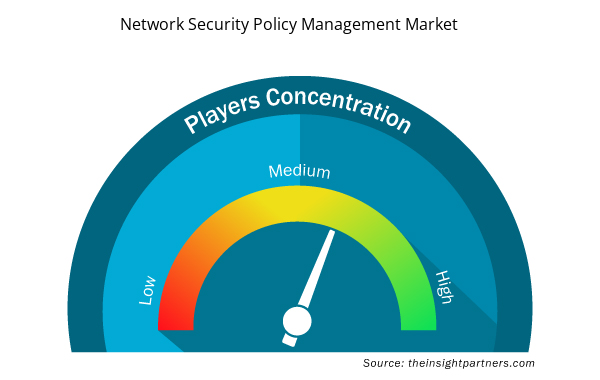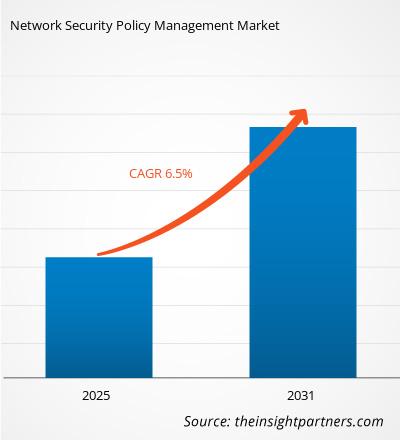The Network Security Policy Management Market is expected to register a CAGR of 6.5% from 2025 to 2031, with a market size expanding from US$ XX million in 2024 to US$ XX Million by 2031.
The Network Security Policy Management Market report covers segmental analysis based on Component, Deployment Model, Solution, End-use, and Enterprise Size. The global analysis is further broken-down at the regional level and major countries. The Report Offers the Value in US$ for the above analysis and segments.
Purpose of the Report
The report Network Security Policy Management Market by The Insight Partners aims to describe the present landscape and future growth, top driving factors, challenges, and opportunities. This will provide insights to various business stakeholders, such as:
- Technology Providers/Manufacturers: To understand the evolving market dynamics and know the potential growth opportunities, enabling them to make informed strategic decisions.
- Investors: To conduct a comprehensive trend analysis regarding the market growth rate, market financial projections, and opportunities that exist across the value chain.
- Regulatory bodies: To regulate policies and police activities in the market with the aim of minimizing abuse, preserving investor trust and confidence, and upholding the integrity and stability of the market.
Network Security Policy Management Market Segmentation
Component
- Software
- Service
Deployment Model
- Cloud
- On-premise
Solution
- Security Policy Management
- Change Management System
- Risk and Vulnerability Analysis
- Application Connectivity Management
Enterprise Size
- Small and Medium Enterprises
- Large Enterprises
Customize This Report To Suit Your Requirement
You will get customization on any report - free of charge - including parts of this report, or country-level analysis, Excel Data pack, as well as avail great offers and discounts for start-ups & universities
Network Security Policy Management Market: Strategic Insights

- Get Top Key Market Trends of this report.This FREE sample will include data analysis, ranging from market trends to estimates and forecasts.
Network Security Policy Management Market Growth Drivers
- Rising Threats Drive Security Needs: The growing ransomware, phishing attacks, and data breaches have increased the demand for effective security policies. Organizations today increasingly focus on network security policy management to keep sensitive data safe and comply with compliance requirements.
- Managing Security in Cloud Environments: Hybrid or multi-cloud infrastructures are the current trend, as most infrastructures are moving to the cloud. In such scenarios, the complexity of implementing security policies across many environments increases multifold; however, NSPM solutions facilitate and automate this process with the least effort to keep security policies consistent across all environments, be it a hybrid or multi-cloud infrastructure.
- Compliance Laws Propel NSPM Adoption: Strict laws, such as GDPR, HIP7.3, and CCPA, demand companies to adhere to stringent policies regarding security measures of user data. Failure to comply with the requirements invites serious fines; thus, companies are willing to deploy NSPM to ensure compliance with evolving regulatory norms without inviting the ensuing fines.
Network Security Policy Management Market Future Trends
- AI and ML Boost NSPM Automation: Solutions within the NSPM department increasingly cater to AI and ML to enable automated creation, monitoring, and enforcement of security policies. With this, insights gained from AI help diagnose vulnerabilities faster with a greater probability of an accurate response to a potential threat.
- Zero Trust Models Enhance Security: The direction followed by zero trust models ensures that no external or internal entity is trusted by default. Thus, NSPM solutions have to enforce granular security controls that are continuously monitored and validated to enhance better network protection.
- IoT Growth Drives NSPM Evolution: The next prominent scope for growth in the security of IoT is the rise in the number of Internet of Things (IoT) devices. NSPM solutions are expected to counter this trend by offering policies that protect interconnected devices against vulnerabilities and ensure security for the networks they access.
Network Security Policy Management Market Opportunities
- SMEs Need Affordable Security Solutions: Most small and medium enterprises lack cybersecurity teams, and most SMEs become victims of various attacks. Thus, here NSPM vendors may provide cost-effective and streamlined solutions to the SMEs so that the SMEs may effectively maintain their network security policy.
- Advanced NSPM Offers Proactive Defense: The advanced NSPM solutions enable the ability to integrate into capabilities in advanced threat intelligence, providing higher proactivity in defense mechanisms. In this sense, the organizations may be able to effectively predict possible threats using AI analyses to ensure proper defense against the modern evolving cyber threats.
- Emerging Markets Demand Digital Security: Digitalization is rapidly gaining prominence in emerging markets such as Latin America, Africa, and Southeast Asia. Leading market growth will witness a strong potential for the expansion of NSPMs, besides huge demand for secure digital infrastructure in regions.
Network Security Policy Management Market Regional Insights
The regional trends and factors influencing the Network Security Policy Management Market throughout the forecast period have been thoroughly explained by the analysts at Insight Partners. This section also discusses Network Security Policy Management Market segments and geography across North America, Europe, Asia Pacific, Middle East and Africa, and South and Central America.

- Get the Regional Specific Data for Network Security Policy Management Market
Network Security Policy Management Market Report Scope
| Report Attribute | Details |
|---|---|
| Market size in 2024 | US$ XX million |
| Market Size by 2031 | US$ XX Million |
| Global CAGR (2025 - 2031) | 6.5% |
| Historical Data | 2021-2023 |
| Forecast period | 2025-2031 |
| Segments Covered |
By Component
|
| Regions and Countries Covered | North America
|
| Market leaders and key company profiles |
Network Security Policy Management Market Players Density: Understanding Its Impact on Business Dynamics
The Network Security Policy Management Market market is growing rapidly, driven by increasing end-user demand due to factors such as evolving consumer preferences, technological advancements, and greater awareness of the product's benefits. As demand rises, businesses are expanding their offerings, innovating to meet consumer needs, and capitalizing on emerging trends, which further fuels market growth.
Market players density refers to the distribution of firms or companies operating within a particular market or industry. It indicates how many competitors (market players) are present in a given market space relative to its size or total market value.
Major Companies operating in the Network Security Policy Management Market are:
- AlgoSec Inc.
- Check Point Software Technologies Ltd
- FireMon, LLC.
- Hewlett Packard Enterprise Development LP
- IBM Corporation
- Forcepoint LLC
Disclaimer: The companies listed above are not ranked in any particular order.

- Get the Network Security Policy Management Market top key players overview
Key Selling Points
- Comprehensive Coverage: The report comprehensively covers the analysis of products, services, types, and end users of the Network Security Policy Management Market, providing a holistic landscape.
- Expert Analysis: The report is compiled based on the in-depth understanding of industry experts and analysts.
- Up-to-date Information: The report assures business relevance due to its coverage of recent information and data trends.
- Customization Options: This report can be customized to cater to specific client requirements and suit the business strategies aptly.
The research report on the Network Security Policy Management Market can, therefore, help spearhead the trail of decoding and understanding the industry scenario and growth prospects. Although there can be a few valid concerns, the overall benefits of this report tend to outweigh the disadvantages.
- Historical Analysis (2 Years), Base Year, Forecast (7 Years) with CAGR
- PEST and SWOT Analysis
- Market Size Value / Volume - Global, Regional, Country
- Industry and Competitive Landscape
- Excel Dataset



Report Coverage
Revenue forecast, Company Analysis, Industry landscape, Growth factors, and Trends

Segment Covered
This text is related
to segments covered.

Regional Scope
North America, Europe, Asia Pacific, Middle East & Africa, South & Central America

Country Scope
This text is related
to country scope.
Frequently Asked Questions
Some of the customization options available based on request are additional 3-5 company profiles and country-specific analysis of 3-5 countries of your choice. Customizations are to be requested/discussed before making final order confirmation, as our team would review the same and check the feasibility.
The report can be delivered in PDF/PPT format; we can also share excel dataset based on the request.
The major factors impacting the Network Security Policy Management Market are: Increasing Cybersecurity Threats, Cloud Adoption and Multi-Cloud Environments, and Regulatory Compliance Requirements.
Key future trends in this market are - Real-time analytics demand surge, Rise in hybrid cloud networks, AI-powered monitoring advancements
Key companies of this market are: AlgoSec Inc., Check Point Software Technologies Ltd., FireMon, LLC., Forcepoint LLC., Hewlett Packard Enterprise Development LP, IBM Corporation, Juniper Networks, Inc., Palo Alto Networks, Inc., Sophos Ltd., Tufin Software Technologies Ltd.
The Network Security Policy Management Market is expected to register a CAGR of 7.3% from 2023-2031.
Trends and growth analysis reports related to Technology, Media and Telecommunications : READ MORE..
1. Palo Alto Networks, Inc.
2. AlgoSec Inc.
3. Check Point Software Technologies Ltd.
4. Forcepoint LLC
5. FireMon, LLC
6. Hewlett Packard Enterprise Development LP
7. IBM Corporation
8. Juniper Networks, Inc.
9. Sophos Ltd.
10. Tufin Software Technologies Ltd.

 Get Free Sample For
Get Free Sample For